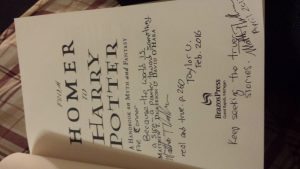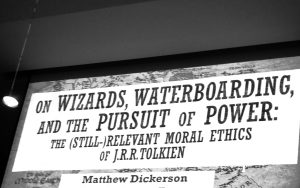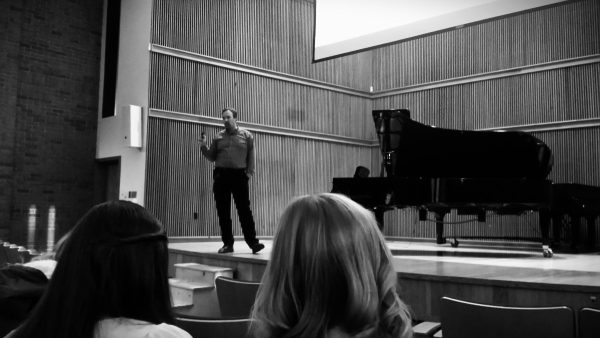Matthew T. Dickerson wasn’t expected to become a published novelist—at least not by his educators. In middle school and high school, teachers pegged him as someone who should focus on math and sciences.
Although this made Dickerson feel less confident about sharing his work, and influenced his college major choice, it didn’t prevent him from writing creatively on the side. He came from a family of book lovers—his father ran an independent bookstore and his mother was a public school teacher who studied literature in college.
By the time he was graduating from high school his avid love of reading had propelled him to start writing his own stories. It wasn’t until he was a student at Dartmouth College studying Paradise Lost, however, that he received any encouragement in his writing. During his senior year at Dartmouth, he took as many writing and literature classes as he could while studying computer science and mathematics.
Later, while working on a PhD in computer science at Cornell University, Dickerson also began taking graduate-level classes in Old English language and literature.
He might have switched completely from computer science to medieval literature, except his graduate advisor in English cautioned him that academic career prospects were not promising in the field: “Across the country this year there are going to be 100 PhDs granted in medieval literature, and we expect only four job openings. Keep your passion for literature and writing alive because you’re good at it, but don’t expect a job in the area.”
Dickerson finished his PhD in computer science from Cornell in 1989 and embarked on what can only be called a diverse career. He works as a professor of computer science at Middlebury College in Vermont. His writings in that subject include numerous research papers and videos in computational geometry and also a book, The Mind and the Machine, which critiques naturalist claims that humans are just complex computers.
In 1991, Dickerson published his first novel, a medieval historic heroic romance called The Finnsburg Encounter (followed by its sequel, The Rood and the Torc, in 2014). His fantasy trilogy, The Daegmon War (The Gifted, The Betrayed, Illengold), was published in 2014-2017.
He’s also written studies of fantasy literature, including From Homer to Harry Potter: A Handbook on Myth and Fantasy and multiple books on C.S. Lewis and J.R.R. Tolkien. His recent Inklings research included two groundbreaking books considering their ecological visions (Ents, Elves, and Eriador: The Environmental Vision of J.R.R. Tolkien, and Narnia and the Fields of Arbol: The Environmental Vision of C.S. Lewis).
His other work includes multiple books on fishing and ecology, a biography of underrated folk rock musician Mark Heard, and the very timely Disciple Making in a Culture of Power, Comfort, and Fear.
In the last book, Dickerson says that its writing was influenced by the passing of Eugene Peterson, whom he knew through the Chrysostom Society. Started in the 1980s to encourage craft and quality in spiritual literature, The Chrysostom Society’s members have included acclaimed fantasy authors like Madeleine L’Engle, Robert Siegel, and Walter Wangerin, Jr.
I discovered Dickerson’s work in 2016 while studying at Taylor University. He visited for several days as a guest speaker, including a chapel sermon on God’s will and a computer science presentation titled “Can Computers Think… and Enjoy Sex?” The answer to whether computers can think or enjoy sex turned out to be “no.”
 After a session, I asked him to autograph my copy of From Homer to Harry Potter.
After a session, I asked him to autograph my copy of From Homer to Harry Potter.
A year later, he spoke at Taylor again, and I attended a talk he gave on Gandalf interrogating Gollum and the prisoner torture ethics. I got the same book signed again.

In July 2022, I wanted to ask some Chrysostom Society members about a late member, poet and fantasy author Robert Siegel. I picked the worst possible time to contact Dickerson: he was staying in a cabin as artist-in-residence for Alaska State Parks, getting off-grid to do some writing. He was very polite, sent me a message that he would get back to me as soon as he could. When he returned home a month later, he directed me to members who could answer my questions about Siegel, and offered to let me interview him about his current projects.
Here are his insightful answers.
Interview Questions:
Thanks again for agreeing to this interview, Matthew. I’ve given readers a short version of your CV, so I won’t ask you to summarize it. Can you tell us what you’re working on right now?
About five years ago, I started a new and very different type of fantasy novel. Not sure how to classify it. It is definitely not swords and dragons. I was really enjoying it, but I felt led to set it aside shortly after the death of Eugene Peterson to work on a book called Disciple Making in a Culture of Power, Comfort, and Fear.
When I finished that, I wanted to go back to the fantasy novel but the demands of pandemic teaching—working twice as hard to be two-thirds as effective—made it hard to do anything creative. But since the start of 2022, I’ve been working on it again and making great progress. I’ve done a lot of polishing and revising, tightening up the prose and story, etc. I’m just finishing it up now and getting ready to shop it.
What was your first encounter with fantasy literature?
Reading The High King (part of The Chronicles of Prydain by Lloyd Alexander) in fifth grade because it was a Newbery Award winner. Unfortunately, I hadn’t read the first four books in the series, which I later came back to and loved.
You’ve described your first novel, The Finnsburg Encounter, as a medieval historic heroic romance. What interested you in that genre?
I was in graduate school at Cornell studying Old English Language and Literature with Prof. Robert Farrell—who had studied at Oxford and known J.R.R. Tolkien personally. Part of my study of Old English was spending a semester translating Beowulf, which I was interested in largely because of its importance to Tolkien. I got interested in finding some old poems in Old English for which part of the story had been lost and trying to retell those stories imaginatively in novel form. The Finn episode in Beowulf inspired that novel.
After writing The Finnsburg Encounter and its sequel, you wrote a high fantasy trilogy, The Daegmon War. What was it like transitioning to the new genre—any connections between the genres you didn’t expect, any surprising obstacles you had to overcome?
The connections, I think, are the easiest. In both cases, of course, good writing—good prose—matters. Character development matters. I wanted to tell a good story, and tell it well. And in both cases, there was considerable imagination involved. In the medieval historical heroic romance, I was drawing on some literary and historical figures, so I had to be “true” to the known stories and histories. For example, the ending of The Finnsburg Encounter was, in a sense, known, and I had to work to a known ending. But that left a lot of room to fill in details imaginatively and to create a number of new characters.
One challenge with the historical work is doing the research—historical, archaeological, literary, etc.—and trying to fill in enough details for readers to get a sense of life in that time, but not to try to cram in so many details that they bog the story down. With fantasy literature, I can, in a sense, invent those details and invent my own histories and cultures. But once I do that, I need to stay consistent. That is, I want my imagined history and geography to be a coherent one.
Again, in both cases, my real goal is just to tell a captivating story about something that matters, with compelling characters that the reader will care about. So, a lot of the craft of fiction writing applies equally to both.
You have the interesting distinction of being a scholar of fantasy literature, but also a writer of it. Those skill sets (analysis and creation) don’t always fit together; for example, film-scholar-turned-filmmaker Paul Schrader has talked about learning to turn off his analyzing side so he could write a script. Do you find that your creative and analytical sides work well together, or do you have techniques for turning the analysis side off while creating something?
That’s a perceptive question. There is certainly an analytical part of my mind that needs to be at work in writing fantasy—including just awareness of what makes good writing craft, as well as contemplating what underlying worldview might be conveyed to readers through my story, the dialogues, the characters, the decisions, the outcomes.
But with the creative writing, I really do have to put a lot more trust in my imagination and creativity. I have to give freedom to the story itself to determine where it’s going to go, and if the characters take me somewhere my analytical mind hadn’t prepared for, generally, I need to trust the story and characters and what you have called the “creative side.”
Scenes and even entire characters appeared in my story that I hadn’t planned on. Sometimes characters responded to a situation in a way I wasn’t expecting. Also, in my creative writing, I don’t start with a message I want to get across. I think that would be disastrous. I don’t write a creative work (in this case, fantasy) to tell my readers what I already know; I’m often writing to explore for myself what I need to learn. Sometimes I don’t even know what the questions are until I’m partway into my novels.
What attracted you to write scholarly works on the Inklings?
Some of that is probably just a selfish excuse to spend time thinking deeply about—and learning more about—something that’s intriguing to me. But I guess the deepest reason is that I think the Inklings, and for me, especially Lewis and Tolkien, wrote so beautifully about such important things that I want to help people understand it more clearly.
Or maybe a better way to put it is that writing about the Inklings is a chance to write about some of the most important and worthwhile themes that we could ever explore as humans. So, writing a book of that sort is a bit like entering a conversation with somebody about something you both care about.
Of the various books you’ve written about the Inklings, which would you recommend readers to start with?
A Hobbit Journey, but only if they have read Tolkien. I guess after that, it would be Narnia and the Fields of Arbol.
You are currently the Vice President of the Chrysostom society, a Christian writers’ community that has included writers like Madeleine L’Engle and Eugene Peterson. How did you get involved in this community?
Well, I wasn’t present at the conversation when somebody in the group recommended me, and they all discussed me. I think I’m glad I didn’t have to hear that conversation!
All I know is that at some point I was invited to join them for a weekend. I didn’t know at the time it was an invitation to be considered for membership. I was only told that some of them were familiar with my book From Homer to Harry Potter: a Handbook of Myth and Fantasy and had enjoyed it, and I was invited to do a reading from that work. And that many of the members were authors whom I had deeply admired whose works had shaped me profoundly. A few of them I had met in person once or twice, but most I didn’t know personally.
I was very delighted when I was asked to join, and I’ve found it to be a very wonderful community of people coming from a wide variety of different expressions of Christian faith with a common care for the value of good writing.
How has belonging to an artist’s community benefitted your work?
Many ways. It’s helped me to strive to be a better writer. I’ve had many encouraging conversations with other members, some of them at times I really needed it. It’s a group that understands some of the challenges of being a writer—and being a writer of Christian faith—and so it’s a group I can talk openly with, and draw nourishment from, and now and then get a needed exhortation from.
Matthew T. Dickerson’s work will appear in A Radiant Birth, the latest book by members of the Chrysostom Society, coming September 5, 2023. It is available for preorder.
To learn more about his work, go to:
https://www.matthewdickerson.net/
https://www.facebook.com/MatthewDickersonBooks
https://www.amazon.com/Matthew-T-Dickerson/e/B001JPALWW
https://www.goodreads.com/author/show/4788867.Matthew_Dickerson
To read an introductory review of Dickerson’s work, go to:
https://apilgriminnarnia.com/2015/01/30/rood/
To learn more about the Chrysostom Society, go to https://chrysostomsociety.org/
Note: All photos used in the article by G. Connor Salter.

